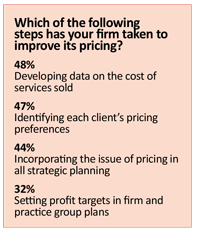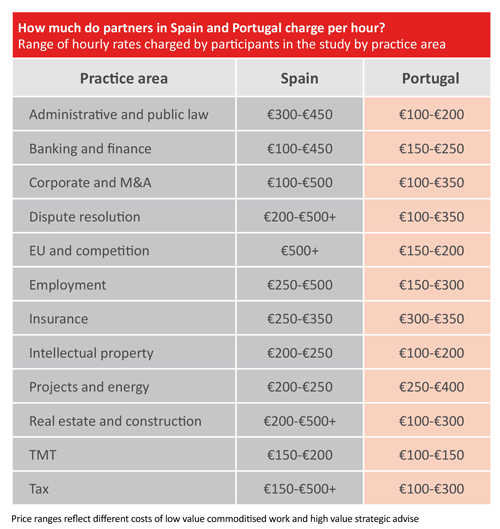Price check
The majority of partners in Spain and Portugal believe that law firms in Iberia could be more profitable and increase workflow if they took a more innovative approach to pricing
It’s time for your firm to re-think its pricing. Reassessing the way you price your work could help your firm win more work and even increase your firm’s profitability. Providing more training on pricing for your lawyers could also reap rewards. These are the conclusions of a new survey of almost 120 partners in Spain and Portugal conducted by Iberian Lawyer.
While almost eight out of ten respondents (80 per cent) said pricing was a “key priority” for their firm, the indications are that the vast majority of partners at firms in Spain and Portugal are dissatisfied with their firm’s approach to pricing. A total of 90 per cent of participants in the study said they thought their firm could improve its pricing. Indeed, there was a widely held view among partners that getting better at pricing could result in increased workflow – three out of four respondents (75 per cent) said their firm “could win more work” by improving its pricing strategy.

 Increasing profitability
Increasing profitability
However, even more intriguingly, most partners thought that although fees are generally in decline a new approach to pricing could make their firm more profitable. A total of 83 per cent of participants in the survey believed that changing their firm’s “strategic approach to pricing could increase the firm’s profitability”. Eight out of ten lawyers (80 per cent) thought that their firm should take steps to “improve its approach to alternative fee arrangements” in particular.
In fairness, most law firms are making some moves to address the issue of pricing. Seventy-three per cent of respondents said their firm had taken some steps to improve its pricing in the last 12 months. So, what exactly are firms doing to tackle problems associated with pricing? Among the most common measures being adopted are “identifying each client’s pricing preferences”, which was cited by 47 per cent of respondents, and “developing data on the cost of services sold” (also identified by 47 per cent of respondents). However, it’s worth emphasizing the point that the majority of partners surveyed said their firm was not taking either of these steps.
 Ignoring pricing?
Ignoring pricing?
Even fewer firms appear to have any profit targets. Only one third of participants in the study said their firm was “setting profit targets in firm and practice group plans”. It also appears that many firms completely fail to address the issue of pricing in any meaningful way. Less than half of respondents (43 per cent) said their firm was incorporating the issue of pricing in “all strategic planning”.
It seems that very few law firms in Spain and Portugal have identified someone within their ranks who should take responsibility for pricing. Only 15 per cent of participants in the study said their firm had taken the step of assigning pricing responsibilities to a current staff member, with only 3 per cent of respondents saying that their firm had recruited a pricing director.
A total of 13 per cent of respondents said that their firm had not taken any of the aforementioned steps to tackle the issue of pricing. Meanwhile, only one in four survey participants (25 per cent) said their firm was training lawyers to “talk with clients about pricing”. Training is clearly a major concern – 82 per cent of those surveyed said they thought their firm needed to provide its lawyers with more training on pricing.
 Hourly billing
Hourly billing
The vast majority of firms still use hourly rates, according to the study. Hourly rates for partners in Spain are, on average, higher than those charged by partners in Portugal – the top hourly rate charged by partners in Spain is more than €500 per hour, while the highest rate charged by partners in Portugal is in the region of €350-€400 (see box). Only 11 per cent of study participants said they did not charge hourly rates. The proportion of law firms’ total revenue that is generated by non-hourly billing varies considerably. More than a third of respondents (37 per cent) said at least 50 per cent of their total fees in 2015 were generated through non-hourly billing. Twelve per cent of study participants said non-hourly billing accounted for at least 80 per cent of their total fees. Meanwhile, 46 per cent of respondents said non-hourly billing accounted for 20-50 per cent of their total fees in 2015.
The general trend is more non-hourly billing, the survey suggests. Two-thirds of study participants (67 per cent) said their firm increased its amount of non-hourly rate-based billing – measured as a percentage of total revenue – in 2015. And the vast majority of partners in Spain and Portugal (92 per cent) believe more non-hourly billing will be a permanent trend.
Non-hourly work more profitable?
However, perhaps surprisingly, not all lawyers view non-hourly billing negatively. Study participants were asked whether their firms’ use of non-hourly based billing was primarily reactive (that is, in response to client requests), or proactive (that is, arising from the firm’s belief in the competitive advantage of alternative fees). More respondents said their firm’s use of non-hourly rates was proactive (49 per cent) than reactive (46 per cent). Furthermore, a sizeable proportion of partners in Spain and Portugal believe that their non-hourly rate work is more profitable than work that is billed on an hourly rate. More than a third of partners (35 per cent) said that, compared to projects billed at an hourly rate, their firm’s non-hourly projects were more profitable.
With the overwhelming majority (94 per cent) of partners at law firms in Iberia acknowledging that price competition is a permanent trend, it seems that now is the time for law firms to reassess their pricing strategies. At the very least firms should be addressing the issue of pricing in their strategic planning. Not only is this what most law firm partners are demanding, it’s a step that could go a considerable way towards making Spanish and Portuguese law firms more profitable.
The choice facing firms is whether to focus on high volume, low value work or ad hoc high value work.










